Promotionsprojekte
Aktuell befinden sich mehrere zugelassene Promotionsvorhaben in Bearbeitung. Sie sind in unsere Forschungsthemen eingebunden und sind in der Regel ein eigenes oder Teil eines größeren Forschungsvorhabens. Abgeschlossene Promotionsvorhaben sind als Volltext auf dem Hochschulschriftenserver QuCoSa einzusehen.
Laufende Promotionsvorhaben
Alexandra Göhring, M. Sc. (Hochschule Pforzheim, HEED-Institut)
»Brücken bauen zwischen Technik und Design. Einfluss von Wissensüberschneidung auf die Zusammenarbeit und Leistung in interdisziplinären Produktentwicklungsteams«
Im Rahmen meiner Promotion beschäftige ich mich mit der Frage, welchen Einfluss Fachwissens- und Kompetenzüberschneidungen von Ingenieur:innen und Industriedesigner:innen auf deren Zusammenarbeit und Teamleistungen haben. Gleichzeitig möchte ich herausfinden, wie durch ein optimales Level an Überschneidung eine Wissensbrücke zwischen beiden Disziplinen gebaut werden kann, um die Zusammenarbeit in der Produktentwicklung so effektiv wie möglich zu gestalten.
Eine erste Metastudie zeigte, dass aktuell keine allgemeingültige Aussage über den Einfluss von fachlicher und funktionaler Heterogenität im Team getroffen werden kann. So gibt es Team-Parameter, bei denen sich eine Wechselwirkung abzeichnet, aber auch solche, bei denen die Ergebnisse ambivalent sind. Hinzu kommen nicht-lineare Effekte, die vermuten lassen, dass ein mittleres Maß an fachlicher und funktionaler Heterogenität die beste Konfiguration für Teamparameter darstellt. Auch Forschungsergebnisse zu Wissensüberschneidungen deuten darauf hin, dass sich eine mittlere Wissensüberschneidung von Teammitgliedern für eine Zusammenarbeit als optimal erweist. Darüber hinaus ist davon auszugehen, dass nicht nur die Quantität des sich überlappenden Wissens von Bedeutung ist, sondern dass auch die Qualität eine Rolle spielt. So seien negative Effekte zu erwarten, wenn sich hochqualitatives Fach- oder Expert:innenwissen nicht überschneidet.
Diese Hypothesen zur Quantität sich überschneidenden Wissens steht im Fokus meines Promotionsvorhabens. Dazu sollen im Rahmen der Hauptuntersuchung Gruppen aus interdisziplinären Ingenieurs- und Industriedesignstudierenden mit unterschiedlichen Graden an Wissensüberschneidung bezüglich ihrer Kooperation und Leistung verglichen werden.
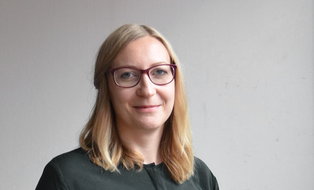 © HS Profzheim
© HS Profzheim
Alexandra Göhring M.Sc.
Hochschule Pforzheim
Dipl.-Des. (FH) Barbara Gröbe-Boxdorfer M. Sc. (HS Pforzheim)
»Integration von Nachhaltigkeitsanforderungen in die interdisziplinäre Produktentwicklung«
Ich beschäftige mich in meinem Promotionsvorhaben mit dem Thema Nachhaltigkeit in der Produktentwicklung. Viele Akteure aus diesem Bereich empfinden eine gewisse Komplexitäts- und Informationsüberflutung. Die Herausforderungen ihrer Arbeit werden durch zunehmende Nachhaltigkeitsansprüche somit weiter erhöht. Die zentralen Fragen meiner Arbeit sind daher:
1. Auf Basis welcher Entscheidungen und Anforderungen einer nachhaltigen Produktentwicklung entwickeln interdisziplinäre Teams ihre Produkte?
2a. Wie integrieren sie die Nachhaltigkeitsanforderungen in den Entwicklungsprozess und welche Werkzeuge und Methoden setzen sie dazu ein?
2b. Welche Rolle spielen Nachhaltigkeitsaspekte bei der Entscheidung für Vorzugsvarianten in der interdisziplinären Produktentwicklung?
3. Welche Bedeutung hat die Nutzungsphase und das Gesamtsystem in dem die Produkte positioniert sind und ihre Verwendung finden, bereits in der frühen Entwicklungsphase der Produkte?
In einer ersten Voruntersuchung habe ich im Jahr 2021 dreizehn narrative Interviews mit Teilnehmern aus unterschiedlichen Disziplinen sowie verschiedenen Unternehmensbereichen bis hin zur Geschäftsführung durchgeführt. Diese ergaben, dass es nach Einschätzung der Interviepartner:innen bei etablierten Produkten schwierig ist, Dinge in Bezug auf Nachhaltigkeit zu ändern, dass Umweltverträglichkeit in der Produktentwicklung kein Teil der Zielsetzung ist, dass das Know-how zum Thema Nachhaltigkeit nicht immer vorhanden ist und dass eine gewisse Hilflosigkeit bei diesem Thema besteht.
Ein studentisches Forschungsprojekt, welches ich 2022 im Masterstudiengang Produktentwicklung betreut habe, kam zu vergleichbaren Ergebnissen.
Die Hauptuntersuchung ist für 2023 angesetzt. Im Rahmen dieser sollen qualitative Leitfadeninterviews mit Mitarbeiter:innen aus den Entwicklungs- und Designabteilungen von Herstellern handgeführter Elektro- und Gartenwerkzeuge durchgeführt werden.
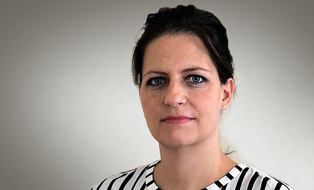 © Hochschule Pforzheim
© Hochschule Pforzheim
Dipl.-Des. (FH) Barbara Gröbe-Boxdorfer M.Sc.
Hochschule Pforzheim
Dipl.-Ing. Emese Papp, B. A.
»How Does An Exoskeleton Feel? Experience of Occupational Exoskeletons«
Im Rahmen meiner Promotion befasse ich mit berufsbezogenen Exoskeletten und deren Wirkung auf die Nutzenden. Exoskelette sind eine noch recht junge Technologie, gewinnen aber immer mehr an Bedeutung. Mit ihrer Hilfe lassen sich arbeitsbedingte Unfälle und Gesundheitsgefahren sowie Fehlzeiten reduzieren. Leider beziehen sich die bisherigen Forschungsergebnisse hauptsächlich auf Aspekte der Funktionalität und Benutzerfreundlichkeit unter Laborbedingungen. Körperliche Aspekte wurden bisher nur über die Ergonomie behandelt und das emotionale Erleben der Nutzer:innen wenn überhaupt am Rande berücksichtigt. Einige Studien konnten aufzeigen, dass positive Erfahrungen für ein lebenswertes Arbeitsumfeld sorgen können und somit Wohlbefinden, Motivation und Leistung steigern sowie die Personalfluktuation verringern. Daher möchte ich mit meiner Promotion die oben genannten Lücken schließen und gleichzeitig herausfinden, wie Design die verschiedenen Ebenen der Nutzendenerfahrung zielgerichtet beeinflussen und die Selbstwahrnehmung sowie die Wahrnehmung des eigenen Körpers beeinflussen kann.
Das Vorgehen dazu gliedert sich im Wesentlichen in vier Schritte. In einer Vorstudie sollen mittels Leitfrageninterviews Bedürfnisse der Nutzer:innen in Bezug auf Exoskelette im industriellen Einsatz geklärt werden. Der zweite Schritt hat zum Ziel, theoretische Grundlagen zu schaffen sowie einen Rahmen zu validieren. Dafür wurde die Forschungsfrage formuliert, welches die Hauptdimensionen der Nutzererfahrung eines beruflichen Exoskeletts, insbesondere in Bezug auf die Körperlichkeit, sind. Dieser Frage wird einerseits durch Literaturrecherche, andererseits durch einen Expertenworkshop nachgegangen. Ziel ist die Entwicklung eines konzeptionellen Rahmens zur Nutzererfahrung von Exoskeletten, der für Entwickler und Nutzer in der Praxis verständlich und nachvollziehbar ist. Den dritten und vierten Schritt bildet jeweils eine Studie. Die erste Studie befasst sich mit den Fragen, welche Eigenschaften eines Exoskeletts positive Emotionen auslösen und wie sich die Körperlichkeit auf die verschiedenen Ebenen der Nutzendenerfahrung auswirkt. Die abschließende Studie bezieht sich auf die oben genannte Frage nach den Einflussmöglichkeiten des Designs. Dafür steht mit dem Ottoblock Shoulder-Exoskelett auch ein Prototyp in zweifacher Ausführung zur Verfügung. Beide Ausführungen haben dieselbe Funktionalität, sind jedoch unterschiedlich gestaltet.
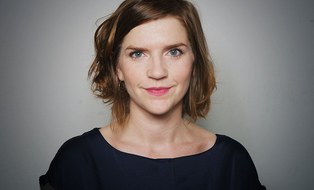 © TD/CPS
© TD/CPS
Dipl.-Ing. Emese Papp B.A.
Research Associate
Eine verschlüsselte E-Mail über das SecureMail-Portal versenden (nur für TUD-externe Personen).
Eva Höfer M.A. (externe Promovierende, Robert Bosch GmbH)
»Corporate Coworking – Gestaltung eines internen Corporate Coworking Space Ökosystems zur Erprobung neuer Arbeitsformen in Industrieunternehmen«
In meiner Promotion stehen Coworking Spaces (CWS) im Fokus. Dabei handelt es sich vereinfacht gesagt um Gemeinschaftsbüros, die von vielen selbstständig Arbeitenden genutzt werden, diesen einen Raum für Gemeinschaft und Austausch bieten und denen eine innovationsfördernde Atmosphäre zugeschrieben wird. Aufgrund dieser Vorzüge werden CWS mittlerweile auch für Unternehmen interessant. Daher wurde am Robert Bosch Campus für Forschung und Vorausentwicklung das „X-Change Lab – Labor für disziplinübergreifende Zusammenarbeit“ als exemplarischer Prototyp eingesetzt. Hier soll untersucht werden, ob ein unternehmensinterner CWS – oder auch Corporate Coworking Space (CCWS) – tatsächlich die Innovationsfähigkeit der Mitarbeitenden eines industriell forschenden Unternehmens fördern kann. Durch Literaturanalyse habe ich bereits Anforderungen an einen CCWS identifiziert. Diese können durch weitere Elemente wie Nutzungsregeln, Hilfsmittel, Veranstaltungen oder auch eine:n Corporate Coworking Community-Manager:in ergänzt werden. Durch einen solchen ganzheitlichen Ansatz kann man ein firmeninternes und nutzerzentriertes Corporate Coworking Ökosystem entwickeln, dessen Wirkung auf die Mitarbeitenden es zu untersuchen gilt.
Für meine Arbeit habe ich 2021 zwei Untersuchungen vorgenommen. Die erste Untersuchung basierte auf einer breiten Literatur- und Internetrecherche zur Identifikation von Corporate Coworking Ansätzen, der sich leitfadenbasierte Interviews mit Betreiber:innen von CCWS anschließen. So sollten der aktuelle Entwicklungsstand und Potentiale von CCWS aber auch Auswirkungen der Covid-19-Pandemie geklärt werden.
Die zweite Untersuchung bezog sich auf die Praxis eines CCWS und die Frage, welche Möglichkeiten ein interner CCWS den Mitarbeitenden eines Forschungs- und Vorausentwicklungsunternehmens bietet und was man daraus für die Gestaltung einer Post-Covid-Arbeitswelt ableiten kann. Dazu wurden Interviews mit Nutzer:innen des X-Change-Labs geführt.
Aus den Ergebnissen soll auch eine Handlungsempfehlung zur Gestaltung von unternehmensinternen CCW-Elementen abgeleitet werden.
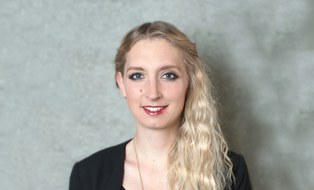 © Eva Höfer
© Eva Höfer
Eva Höfer M.A.
Robert Bosch GmbH
Dipl.-Ing. Tina Bobbe
»Die Rolle des Technologiedemonstrators bei der externen Kommunikation von Wissenschaft«
Ich beschäftige mich in meinem Promotionsvorhaben mit Demonstratoren und ihrem Potential Menschen mit Zukunftstechnologien in Berührung zu bringen.
Wissenschaftskommunikation ist wichtig und aktueller denn je. Mit Demonstratoren gibt es die Möglichkeit eines interaktiven Mediums, um aktuelle Wissenschaft und Technologien der breiten Öffentlichkeit näher zu bringen. In dieser Arbeit wird das Konzept des Demonstrators als Designartefakt erforscht, sowie das Erleben von Demonstratoren im Kontext der Wissenschaftskommunikation untersucht.
Dafür wurde zunächst Literatur in den Bereichen Designforschung, Wissenschaftskommunikation und Museumsforschung analysiert und zusammengebracht. Im nächsten Schritt wurden Demonstrator-Fallstudien qualitativ analysiert, um ein Demonstratordesign-Framework zu entwickeln. Schließlich wurde das Erleben von Demonstratoren in einer quantitativen Feldstudie evaluiert, um zu verstehen, welche Effekte verschiedene Demonstrator-Varianten auf Spaß, Verständnis, Einstellung und Interesse von Besucher:innen haben. Das Ziel ist es Wissenschaftler:innen evidenzbasiertes Designwissen zur Verfügung zu stellen, um mit effektiven Demonstratoren möglichst viele Menschen mit zukünftigen Technologien zu begeistern.
 © Technisches Design
© Technisches Design
Dr. Tina Bobbe
Team-Lead, Research Associate
Eine verschlüsselte E-Mail über das SecureMail-Portal versenden (nur für TUD-externe Personen).
Lea Schmidt, M. A. (externe Promovierende HSLU Luzern, Kunst und Design)
»Mono-material and variety«
Im Rahmen meiner Promotion beschäftige ich mich mit dem Ansatz der Monomaterialität im Hinblick auf eine optimierte Materialzirkularität.
Häufig werden verschiedene Materialien verwendet, um einen ästhetischen oder funktionalen Kontrast bei Artefakten zu erreichen. Diese stets zunehmende materielle Komplexität ist ein entscheidendes Hindernis im Hinblick auf Materialzirkularität. Wenn Artefakte aus einem einzigen Material bestehen, können sie, je nach Werkstoff, mehr oder weniger direkt in einen Materialkreislauf zurückgeführt werden. Daher ist der Ansatz der Monomaterialität ökonomisch und ökologisch attraktiv. Zudem liegt in ihm bei näherer Betrachtung ein spannendes Feld für das Design: Durch gezielte Designstrategien lässt sich mit einem einzigen Material eine große ästhetische und funktionale Vielfalt erreichen.
In meinem Promotionsvorhaben entwickle ich theoretische Grundlagen für einen Monomaterialansatz im Design im Hinblick auf optimierte Materialzirkularität. In einer an die Dissertation angeschlossenen Machbarkeitsstudie konnte ich mit einem interdisziplinären Team den Ansatz zudem anwendungsorientiert am Werkstoff Polyester überprüfen. In der Machbarkeitsstudie wurden feste als auch flexible Materialeigenschaften genutzt und in Artefakten kombiniert. Als Prototypen konnten eine Outdoor-Jacke und ein Rucksack realisiert werden.
Die Vision meines Projekts ist es, eine große Varianz in einem Material zu erreichen, um Recyclingprozesse zu vereinfachen und gleichzeitig die steigenden Anforderungen an die funktionale und ästhetische Komplexität von Textilprodukten zu erfüllen.
Dipl.-Ing. Lisa-Marie Lüneburg
»Experiencing the Future Today: The Role of User Experience Design in the Transfer of Close-to-body Technologies«
Ich beschäftige mich in meiner Promotion mit der Frage, welche Faktoren bei der Entwicklung eines Minimal Lovable Products (MLPs) ausschlaggebend sind. MLPs sind Testprodukte, mit deren Hilfe Startups herausfinden wollen, welche Kriterien ein neues Produkt erfüllen muss, damit es nicht nur funktioniert, sondern auch bei den Nutzer:innen gut ankommt und sich somit erfolgversprechend auf dem Markt anbieten lässt. Da es bisher noch recht wenige Erkenntnisse zu den Charakteristika eines MLP gibt, möchte ich basierend auf der Methodik des User Experience Designs Faktoren identifizieren, die es Forschenden und Entwickelnden erleichtert, ein MLP effizient und nutzerzentriert zu entwickeln.
Der Fokus der Arbeit liegt dabei auf körpergetragenen Technologieprodukten, da die Promotion parallel zur Gründung eines Startups läuft. Dieses entwickelt intelligente Kleidung, die mit Hilfe von vibrotaktilem Feedback die Ausführung von Bewegungen unterstützt – zum Beispiel in der Physiotherapie zur Behandlung von Rückenschmerzen oder beim Yoga. Da körpergetragene Technologien in Zukunft wahrscheinlich vermehrt zum Einsatz kommen werden und es bisher noch wenige Untersuchungen zu deren Wirkung (insbesondere am Körper), bietet die Arbeit großes Potential, neue Erkenntnisse für die Gestaltung solcher Produkte liefern zu können.
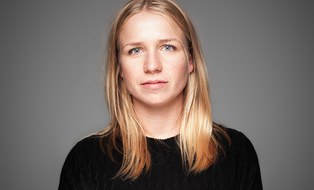 © Frank Mühlbauer
© Frank Mühlbauer
Dipl.-Ing. Lisa-Marie Lüneburg
Team-Lead, Research Associate
Eine verschlüsselte E-Mail über das SecureMail-Portal versenden (nur für TUD-externe Personen).
Dipl.-Ing. Lenard Opeskin
»Partizipatives Boundary Prototyping als transformative Praxis in Reallaboren«
Ich untersuche in meiner Promotion, inwiefern es sich beim partizipativen Design-Prototyping um eine geeignete Praxis zur transdisziplinären Forschung in Reallaboren handelt. In Reallaboren werden in lokal begrenzten Dimensionen Lösungen für komplexe gesellschaftliche Probleme erarbeitet, die sich entweder skalieren oder auf andere Bereiche übertragen lassen. In Form von transdisziplinären Forschungsprozessen wird dabei „handlungsleitendes Wissen“ von Akteur:innen aus Wissenschaft und Gesellschaft koproduziert. Diese in den Reallaboren erarbeiteten Lösungen sowie das koproduzierte Wissen sollen zum Beispiel dabei helfen, soziotechnische Systeme in nachhaltige Konfigurationen zu transformieren.
Mit Blick auf die Eignung partizipativem Design-Prototypings für eine transdisziplinäre Forschung stellt sich die Frage, wie die verschiedenen Akteur:innen durch das Prototyping gesellschaftliche Probleme in ihrer Komplexität verhandeln (Systemwissen) und gemeinsam wünschenswerte Zukünfte erarbeiten (Zielwissen). Darüber hinaus möchte ich beleuchten, wie innerhalb dieses Prozesses Boundary Objects entstehen, an denen die Akteur:innen trotz heterogener Sichtweisen gemeinsam Schritte hin zu wünschenswerten Zukünften formulieren (Transformationswissen) und die von allen Akteur:innen unterstützt werden.
Im Rahmen dieses Promotionsvorhabens stelle ich zwei Untersuchungen an. Die qualitative und explorative Voruntersuchung befasst sich mit dem Thema „Beteiligungsformate und partizipatives Design-Prototyping in Reallaboren oder transdisziplinärer Forschung zu Nachhaltigkeitstransformationen“ und besteht aus halbstrukturierten Leitfadeninterviews mit acht bis zwölf Forscher:innen. Die Hauptuntersuchung ist als teilnehmende Beobachtung des Boundary Object Prototypings in transdisziplinärem Forschungsprozess angelegt. Dabei sollen auch Focus-Groups mit beteiligten Akteur:innen zu den erzeugten Prototypen gebildet werden.
 © Lenard Opeskin
© Lenard Opeskin
Dipl.-Ing. Lenard Opeskin
Research Associate
Eine verschlüsselte E-Mail über das SecureMail-Portal versenden (nur für TUD-externe Personen).
Nikolas F. Neumann, M. Sc.
»Verhaltensökonomie und nachhaltige Produktgestaltung —
Integration von Verhaltensökonomie und quantitativer Evaluationsmethoden in die Praxis der nachhaltigen Produktgestaltung«
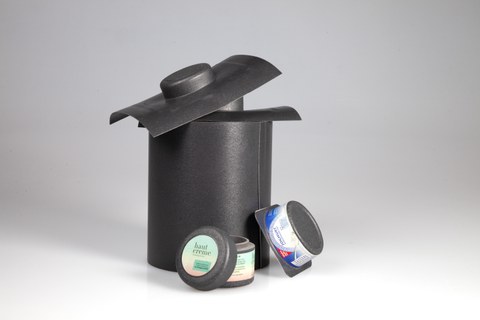
Rezyklatbasierte Lebensmittel- und Kosmetikaverpackungen
Meine Promotion befasst sich mit der Frage ob psychologische Prinzipien (insbesondere aus der Verhaltensökonomie) genutzt werden können, um einen ökologischeren Umgang mit Produkten anzuregen. Dazu werden konkrete Interventionen im Themenbereich PCR-Kunststoffe mit einem Fokus auf Verpackungen entwickelt um sie dann qualitativ und quantitativ zu evaluieren.
Ausgangspunkt der Arbeit sind die Auswirkungen des vom Menschen verursachten Klimawandels und weitere ökologische Probleme, wie das Artensterben oder die Verschmutzung der Meere durch Plastik, die einen weitreichenden ökologischen Strukturwandel notwendig machen. Um dieses Ziele zu erreichen will die internationale Staatengemeinschaft im Rahmen der Ziele für nachhaltige Entwicklung („Sustainable Development Goals“) auch das Hilfsmittel der verhaltensökonomischen Erkenntnisse anwenden, um nachhaltige Verhaltensweisen anzustoßen bzw. umweltschädliche Verhaltensweisen unwahrscheinlicher zu machen.
Die Verhaltensökonomie („Behavioral Economics“) erforscht, inwieweit Menschen Entscheidungen auf der Basis rationaler Faktoren treffen und welche eigentlich für eine rationale Entscheidung irrelevanten Faktoren dabei Einfluss nehmen. Die Anwendung dieser Forschungsergebnisse im Bereich der Nachhaltigkeit, das sogenannte „Green Nudging“ („Grüne Stupser“), zeigt in vielen Fällen beachtlichen Erfolg.
Auch in der Produktgestaltung wird daran geforscht, wie Produkte so gestaltet werden können, dass sie einen umweltverträglichen Umgang mit ebendiesen anregen bzw. kein umweltschädliches Verhalten anstoßen. Dieser Forschungszweig nennt sich Design for Sustainable Behavior (DfSB). An diesen Bereich schließt die Promotion an.
Das DfSB hat verschiedene Interventionstechniken entwickelt, wie ein nachhaltiger Produktumgang angestoßen werden kann. Diese Techniken beziehen sich aber nicht auf eine zugrundeliegende Theorie. Deshalb hat das Feld Schwierigkeiten die Auswahl bestimmter Techniken zu begründen. Außerdem wurden die Strategien der Verhaltensökonomie bis jetzt nicht aufgegriffen. Daran anschließend bildet die Verhaltensökonomie den ersten Orientierungspunkt der Arbeit, um Theoriebasierte Interventionen zu entwickeln.
Darüber hinaus wurden die bereitgestellten Techniken im DfSB bisher nicht auf ihre Wirksamkeit überprüft und auch konkrete praktische Interventionen werden bis jetzt nicht quantitativ evaluiert. Dementsprechend stellt die Evaluation entwickelter Designinterventionen mithilfe statistischer Verfahren das zweite Standbein der Promotion dar.
Nicht zuletzt soll der Begriff der Umweltwirkungen, der sich im DfSB fast ausschließlich auf CO2-Emissionen bezieht geweitet werden und damit das Spektrum der möglichen Interventionsbereiche erweitert werden. Forschungspotenzial bietet hier insbesondere das Ökodesign.
 © Technisches Design
© Technisches Design
Nikolas Neumann M. Sc.
Research Associate
Eine verschlüsselte E-Mail über das SecureMail-Portal versenden (nur für TUD-externe Personen).
Dipl.-Ing. Max Pötter
»Bewertung der Benutzererfahrung von Robot Teaching-Systemen für Nicht-Experten in Industrie und Handwerk«
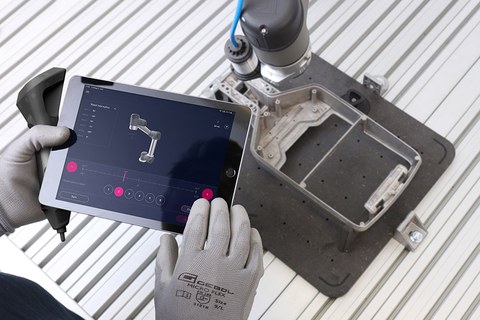
Ein Robot Teaching-System für intuitive Roboter Programmierung
Da kollaborative Roboter (Cobots) zu einem integralen Bestandteil verschiedener Branchen werden, ist der Bedarf an intuitiven und effizienten Programmiermethoden (Robot Teaching) von größter Bedeutung. Mit den aktuellen Methoden des Robot Teaching (RT) haben Laien oft Schwierigkeiten, da es Forschern und Entwicklern an einer effektiven Bewertungsmethode fehlt, um Erkenntnisse der Benutzer in ihre Entwicklungsprozesse einfließen zu lassen.
Meine Forschung zielt darauf ab, diese Lücke zu schließen, indem ich ein validiertes Modell zur Bewertung der Benutzererfahrung speziell für Robot Teaching-Systeme entwickle. Ein Schwerpunkt meiner Arbeit liegt darin, die Wechselwirkungen zwischen verschiedenen Faktoren der Benutzererfahrung zu verstehen, wie z. B. Vertrauen, Sicherheit und emotionale Reaktionen, die oft selektiv bewertet werden, aber für eine effektive Bewertung der Benutzererfahrung vollumfänglich berücksichtigt werden müssen. Gleichzeitig muss die Methode für Forscher und Entwickler von Robotersystemen leicht anwendbar sein, sodass ein Gleichgewicht zwischen Vollständigkeit und Effektivität gefunden werden muss.
Letztendlich ist es mein Ziel, Fachleuten Werkzeuge an die Hand zu geben, mit denen sie effektiv Erkenntnisse über die Benutzer gewinnen und ihre Systeme verbessern können, um positive Benutzererfahrungen zu ermöglichen. Dadurch können Unternehmen die Akzeptanz von Cobots in professionellen Umgebungen erhöhen, die körperliche Arbeitsbelastung verringern und die Mitarbeiter von sich wiederholenden Aufgaben befreien, was zu einer besseren Lebensqualität der Mitarbeiter beiträgt und gleichzeitig die Produktivität steigert. Meine Forschung zielt nicht nur darauf ab, die Benutzerfreundlichkeit von RT-Systemen zu verbessern, sondern auch eine Zukunft zu fördern, in der Roboter und Menschen effizient zusammenarbeiten und die Stärken des jeweils anderen optimal nutzen.
Informationen für Interessierte
Als Einrichtung der Technischen Universität Dresden betreiben wir Designforschung nach wissenschaftlichen Maßstäben. Einzelne Forschungsvorhaben werden im Rahmen von Promotionsvorhaben durchgeführt, womit mit erfolgreichem Abschluss der akademische Grad »Dr.-Ing.« erworben wird. Dabei gehen wir weniger der Frage nach, wie Designforschung zu definieren sei, sondern adressieren für die Disziplin relevante Fragestellungen mit wissenschaftlicher Forschung, die auch praktische Entwurfsanteile enthalten kann. Eine Promotion ist im Verständis unserer Promotionsordnung der individuelle Nachweis von »über die [Diplom-/Master-] Prüfung hinausgehende wissenschaftliche Bildung im Wissenschaftsgebiet und […] besondere Befähigung zu selbständiger wissenschaftlicher Arbeit«, die im Rahmen der Dissertation erbracht wird. Dabei müssen die Ergebnisse »die Entwicklung des speziellen Wissenschaftsgebietes, seiner Theorien und Methoden fördern« – also neue Erkenntnisse zum Design, seinen Theorien oder Methoden bieten.
Die Promotion im Design wird an der Fakultät Maschinenwesen nach der dort gültigen Promotionsordnung durchgeführt. Die Voraussetzung zur Zulassung ist in der Regel ein mindestens mit der Note »gut« abgeschlossenes Hochschulstudium (300 ECTS) oder ein »sehr gut« abgeschlossenes Fachhochschulstudium mit einem Mindestanteil an technischen Fächern. Details zu den formalen Voraussetzungen können mit uns unbürokratisch geklärt werden.
Die Promotionsvorhaben werden eng betreut und folgen einer bewährten Struktur für empirische Forschungsvorhaben. Für unsere Promovierenden finden regelmäßig zweitägige Kolloquien statt, wir organisieren Schreibwerkstätten und -klausuren und bieten ein umfangreiches methodisches Weiterbildungsangebot an. Die Promovierenden können die hervorragenden Angebote unserer Graduiertenakademie in Anspruch nehmen. Die Promovierenden präsentieren ihre Vorhaben auf nationalen und internationalen Konferenzen und erhalten dort zusätzliches Feedback.
Wenn Sie sich für ein Promotionsvorhaben zu menschzentrierter Technikentwicklung, Mensch-Technik-Interaktion, Circular Design oder verwandten Themen an der TU Dresden interessieren, kontaktieren Sie uns gern!
 © TU Dresden
© TU Dresden
Prof. Dr.-Ing. Jens Krzywinski
Chair of Industrial Design Engineering
Eine verschlüsselte E-Mail über das SecureMail-Portal versenden (nur für TUD-externe Personen).
